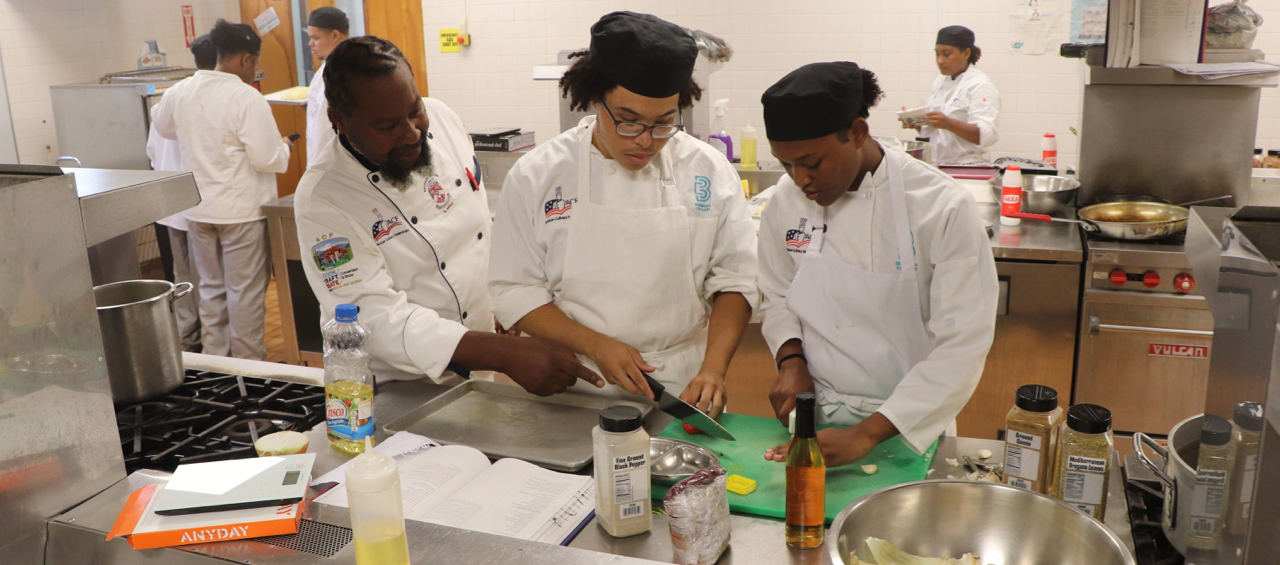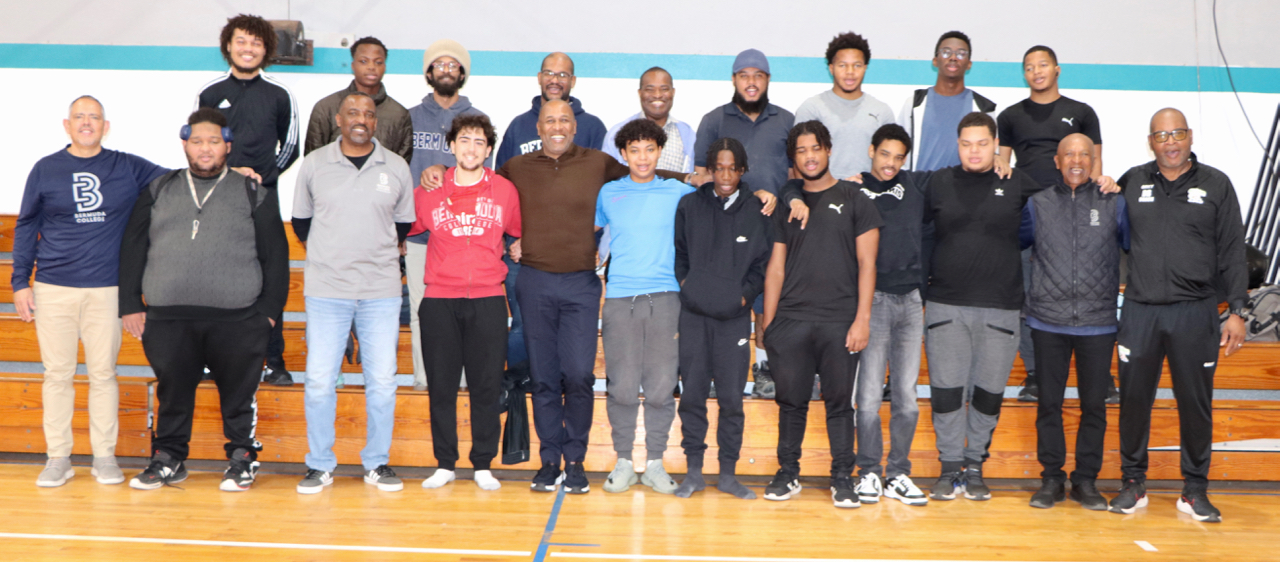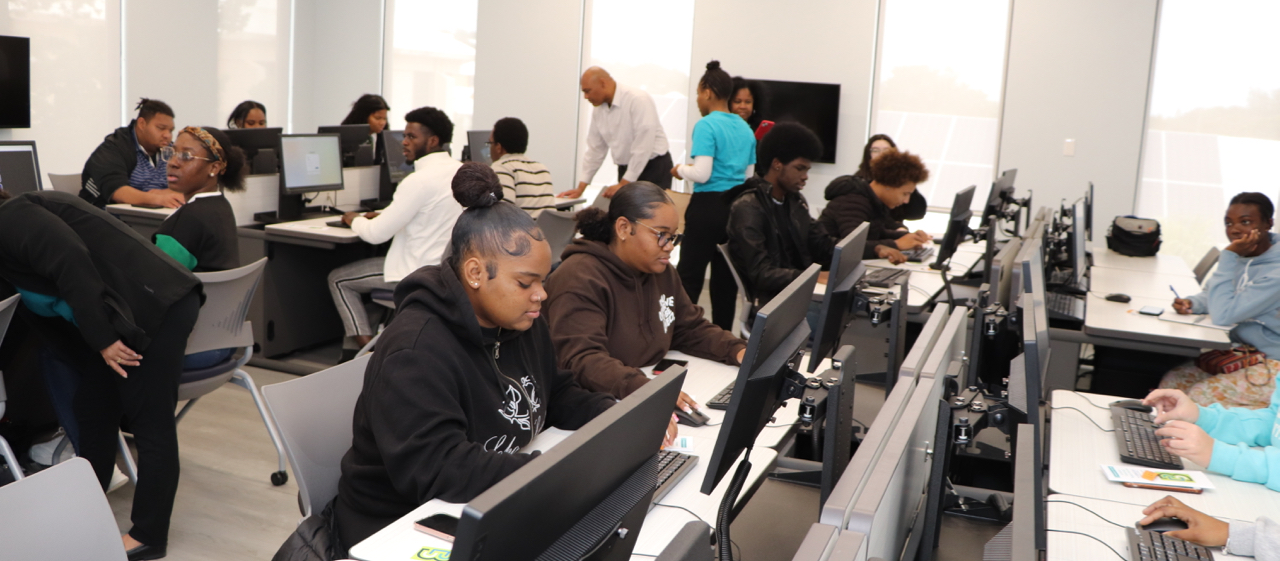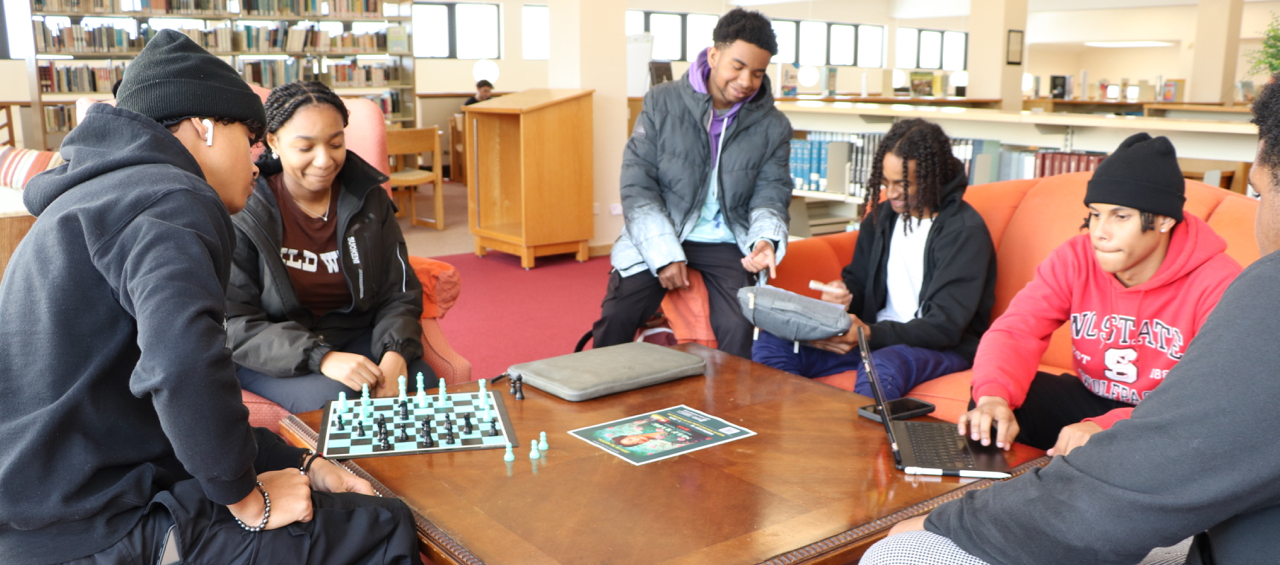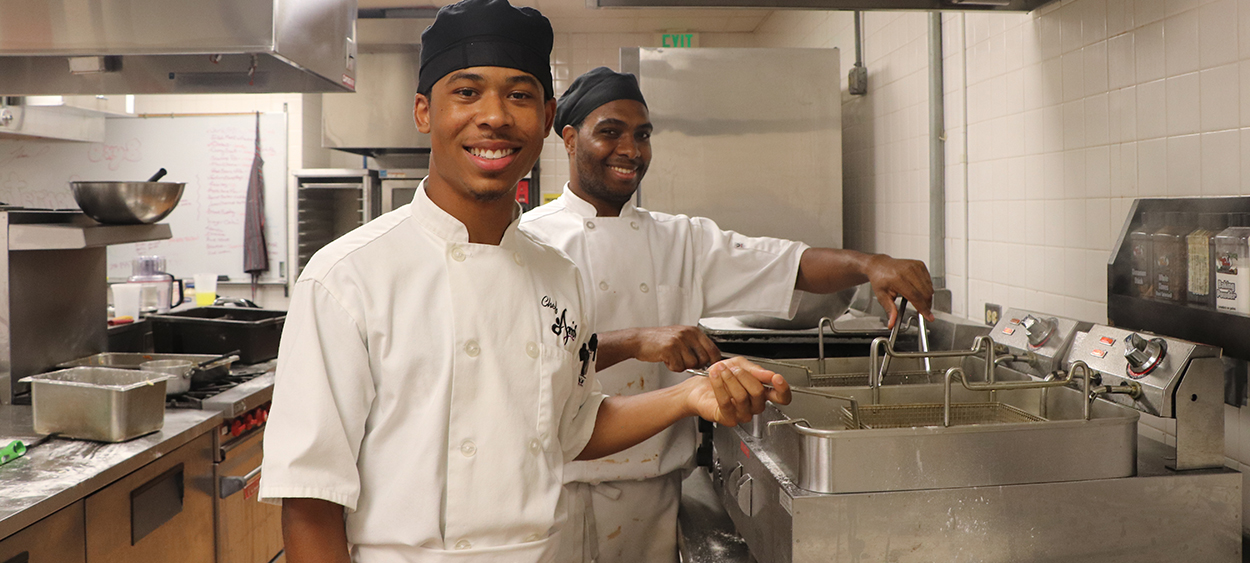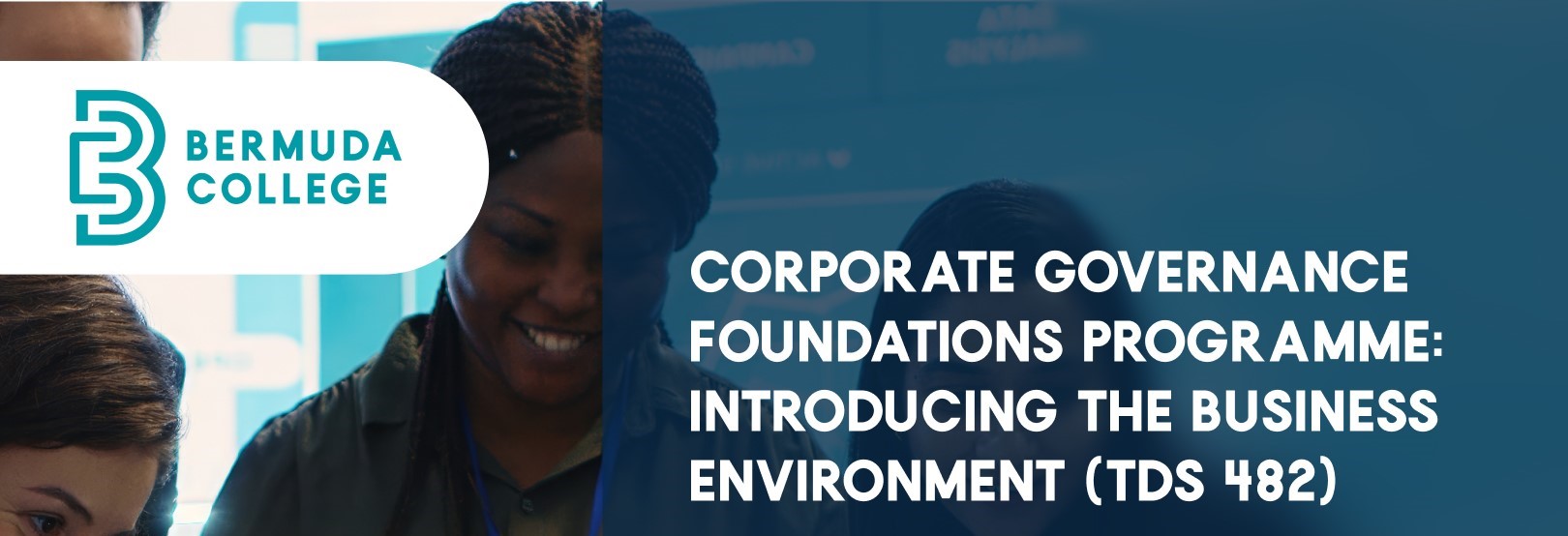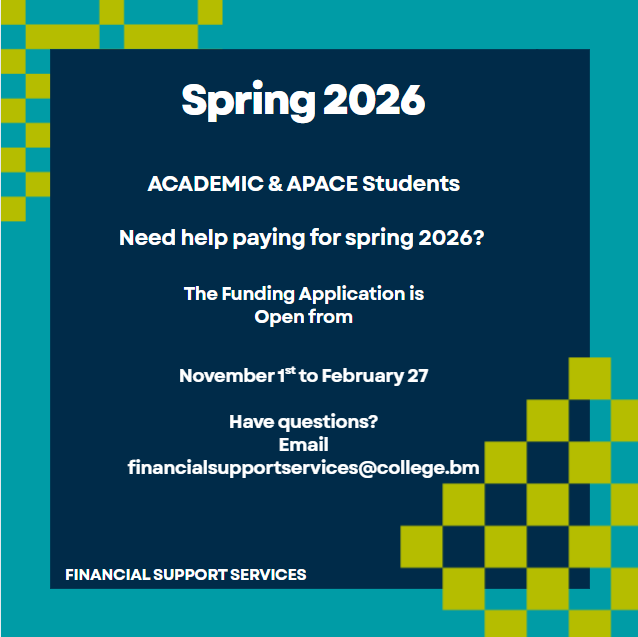Associate of Applied Science (Plumbing Technology)
Associate of Applied Science (Plumbing Technology)
Developed with the assistance of employers in this field, this competency-based, modularised programme usually takes two years to complete. Students will experience lectures, practical assignments and self-directed activities as they progress through the modules, working with a lecturer and being evaluated on a skills basis. Graduates will be able to sit the City and Guilds Scheme 6129 Examinations and also meet the Bermuda National Training Board and the National Centre for Construction Education and Research (NCCER) standards for entering the plumbing trade.
Pre-requisite: NCCER Core (8CR)
Print
Programme Details
CURRICULUM TOTAL CREDITS: 69
Year 1
First semester - 19 credits
CSC 1110 Learning Strategies for Student Success 1
ENG 1111 Freshman Composition 3
MAT 1105 College Algebra I 3
CIS 1120 Introduction to Business Applications of Computers 3
Career Concentration:
PLM 1101 Introduction to the Plumbing Profession, Safety and Tools 4
PLM 1102 Plastic Pipe, Copper, Cast Iron, Steel Pipe and Fittings 3
PLM 1103 Fixtures and Faucets, Drain, Waste and Vent Systems, Water
Distribution Systems 2
Second semester - 16 credits
ENG 1115 Writing for Professionals 3
MAT 1141 Pre-Calculus 3
Career Concentration:
PLM 1104 Commercial Drawings, Hangers and Supports, Installing DWV Piping 4
PLM 1105 Types of Valves, Installing Water Supply Piping, Installing
Fixtures and Faucets 3
PLM 1106 Installing Water Heaters, Servicing Fixtures, Valves, and Faucets 3
Year 2
First semester - 20 credits
MGN 1114 Introduction to Business 3
PED or RSO Physical Education or Registered Student Organisation 1
PHY 1121 Principles of Physics I 4
Elective Course in Social Science 3
Career Concentration:
PLM 2107 Sizing Water Supply Piping, Potable Water Treatment 3
PLM 2108 Backflow Preventers, Types of Venting, Sizing DWV Systems 4
PLM 2109 Sewage Pumps, Compressed Air 2
Second semester - 15 credits
MGN 2245 Introduction to Small Business Management 3
PHY 1122 Principles of Physics II 4
Career Concentration:
PLM 2110 Business Principles for Plumbers, Water Pressure Systems 3
PLM 2111 Codes, Private Water Supply Well Systems 3
PLM 2112 Swimming Pools and Hot Tubs, Plumbing for Mobile Homes 2
NCCER Core Courses
Basic Safety NCC 1101 1 SP/SM
Complies with OSHA-10 training requirements. Explains the safety obligations of workers, supervisors, and managers to ensure a safe workplace. Discusses the causes and results of accidents and the impact of accident costs. Reviews the role of company policies and OSHA regulations. Introduces common job-site hazards and identifies proper protections. Defines safe work procedures, proper use of personal protective equipment, and working with hazardous chemicals. Identifies other potential construction hazards, including hazardous material exposures, welding and cutting hazards, and confined spaces.
Mathematics NCC 1102 1 SP/SM
Reviews basic mathematical functions such as adding, subtracting, dividing, and multiplying whole numbers, fractions and decimals, and explains their applications to the construction trades. Explains how to use and read various length measurement tools, including standard and metric rulers and tape measures, and the architect’s and engineer’s scales. Explains decimal-fraction conversions and the metric system, using practical examples. Also reviews basic geometry as applied to common shapes and forms.
Hand Tools NCC 1103 1 SP/SM
Introduces trainees to hand tools that are widely used in the construction industry, such as hammers, saws, levels, pullers, and clamps. Explains the specific applications of each tool and shows how to use them properly. Also discusses important safety and maintenance issues related to hand tools.
Power Tools NCC 1104 1 SP/SM
Provides detail descriptions of commonly used power tools, such as drills, saws, grinders, and sanders. Reviews applications, proper use, safety, and maintenance. Many illustrations show power tools used in on-the-job settings.
Introduction to Construction Drawings NCC 1105 1 SP/SM
Familiarises trainees with basic terms for construction drawings, components, and symbols. Explains the different types of drawings (civil, architectural, structural, mechanical, plumbing/piping, electrical, and fire protection) and instructs trainees on how to interpret and use drawing dimensions. Four oversized drawings are included.
Basic Communication Skills NCC 1107 1 SP/SM
Provides trainees with techniques for communicating effectively with co-workers and supervisors. Includes practical examples that emphasise the importance of verbal and written information and instructions on the job. Also discusses effective telephone and e-mail communication skills.
Employability Skills NCC 1108 1 SP/SM
Identifies the roles of individuals and companies in the construction industry. Introduces trainees to critical thinking and problem solving skills and computer systems and their industry applications. Also reviews effective relationship skills, effective self-presentation and key workplace issues such as sexual harassment, stress and substance abuse.
Introduction to Materials Handling NCC 1109 1 SP/SM
Recognises hazards associated with materials handling and explains proper materials handling techniques and procedures. Also introduces materials handling equipment and identifies appropriate equipment for common job-site tasks.
Credit Course Descriptions
Associate of Applied Science (Motor Vehicle Technology)
Associate of Applied Science (Motor Vehicle Technology)
The Associate in Applied Science in Motor Vehicle Technology at Bermuda College has been developed by the Bermuda College, National Training Board (NTB) and the automotive industry.
The curriculum is designed to meet international and local standards, with the intent that students are competent to sit the Automotive Service Excellence (A.S.E.) and City & Guilds Automotive Technology certifications from the U.S.A. and London, England. This modularised programme takes two years to complete. Students will experience lectures, practical assignments, and self-directed activities. Additionally, industry experience will be a required component of their curriculum as they progress through the modules, working with the lecturer and being evaluated on a skills basis.
Upon completion, students will be eligible to receive an industry-recognised degree in automotive technology from Bermuda College and enter the automotive industry as a second-year apprentice automotive technician.
Pre-requisite: NCCER Core (8CR)
Print
Programme Details
CURRICULUM TOTAL CREDITS: 54
Year 1
First semester - 19 credits
CSC 1110 Learning Strategies for Student Success 1
CIS 1120 Introduction to Business Applications of Computers 3
ENG 1111 Freshman Composition 3
MAT 1105 College Algebra I 3
Career Concentration:
MVT 1104 Electrical Systems 3
MVT 1105 Battery/Charging Systems 3
MVT 1106 Starting Systems 3
Second semester - 12 credits
ENG 1115 Writing for Professionals 3
MAT 1141 Pre-Calculus 3
Career Concentration:
MVT 1101 Ignition Systems 2
MVT 1102 Fuel/Exhaust Systems 2
MVT 1103 Exhaust Emissions Systems 2
Year 2
First semester - 13 credits
MGN 1114 Introduction to Business 3
PHY 1121 Principles of Physics I 4
Elective Course in Social Science 3
Career Concentration:
MVT 2107 Braking Systems 1
MVT 2108 Hydraulic Brake Systems 1
MVT 2109 Anti-lock Brake Systems 1
Second semester - 10 credits
MGN 2245 Introduction to Small Business Management 3
PHY 1122 Principles of Physics II 4
Career Concentration:
MVT 2110 Steering Systems 1
MVT 2111 Power Steering Systems 1
MVT 2112 Suspension Systems
NCCER Core Courses
Basic Safety NCC 1101 1 SP/SM
Complies with OSHA-10 training requirements. Explains the safety obligations of workers, supervisors, and managers to ensure a safe workplace. Discusses the causes and results of accidents and the impact of accident costs. Reviews the role of company policies and OSHA regulations. Introduces common job-site hazards and identifies proper protections. Defines safe work procedures, proper use of personal protective equipment, and working with hazardous chemicals. Identifies other potential construction hazards, including hazardous material exposures, welding and cutting hazards, and confined spaces.
Mathematics NCC 1102 1 SP/SM
Reviews basic mathematical functions such as adding, subtracting, dividing, and multiplying whole numbers, fractions and decimals, and explains their applications to the construction trades. Explains how to use and read various length measurement tools, including standard and metric rulers and tape measures, and the architect’s and engineer’s scales. Explains decimal-fraction conversions and the metric system, using practical examples. Also reviews basic geometry as applied to common shapes and forms.
Hand Tools NCC 1103 1 SP/SM
Introduces trainees to hand tools that are widely used in the construction industry, such as hammers, saws, levels, pullers, and clamps. Explains the specific applications of each tool and shows how to use them properly. Also discusses important safety and maintenance issues related to hand tools.
Power Tools NCC 1104 1 SP/SM
Provides detail descriptions of commonly used power tools, such as drills, saws, grinders, and sanders. Reviews applications, proper use, safety, and maintenance. Many illustrations show power tools used in on-the-job settings.
Introduction to Construction Drawings NCC 1105 1 SP/SM
Familiarises trainees with basic terms for construction drawings, components, and symbols. Explains the different types of drawings (civil, architectural, structural, mechanical, plumbing/piping, electrical, and fire protection) and instructs trainees on how to interpret and use drawing dimensions. Four oversized drawings are included.
Basic Communication Skills NCC 1107 1 SP/SM
Provides trainees with techniques for communicating effectively with co-workers and supervisors. Includes practical examples that emphasise the importance of verbal and written information and instructions on the job. Also discusses effective telephone and e-mail communication skills.
Employability Skills NCC 1108 1 SP/SM
Identifies the roles of individuals and companies in the construction industry. Introduces trainees to critical thinking and problem solving skills and computer systems and their industry applications. Also reviews effective relationship skills, effective self-presentation and key workplace issues such as sexual harassment, stress and substance abuse.
Introduction to Materials Handling NCC 1109 1 SP/SM
Recognises hazards associated with materials handling and explains proper materials handling techniques and procedures. Also introduces materials handling equipment and identifies appropriate equipment for common job-site tasks.
Credit Course Descriptions
Associate of Applied Science (Heating Ventilation & Air Conditioning)
Associate of Applied Science (Heating Ventilation & Air Conditioning)
Developed with the assistance of employers in this field, this competency-based, modularised programme usually takes two years to complete. Students will experience lectures, practical assignments, and self-directed activities as they proceed through the modules, working with a lecturer and being evaluated on a skills basis. In addition to instruction in the theoretical aspects of heating, ventilating and air conditioning repair, extensive practical experience in an internship is an integral part of the programme.
Graduates will be eligible to receive an industry-recognised certificate in HVAC from the National Centre for Construction Education and Research (NCCER), and also meet the Bermuda National Training Board standard for entering the Heating, Ventilating, and Air Conditioning Technology trade.
Pre-requisite: NCCER Core (8CR)
Print
Programme Details
CURRICULUM TOTAL CREDITS: 69
Year 1
First semester - 15 credits
CSC 1110 Learning Strategies for Student Success 1
CIS 1120 Introduction to Business Applications of Computers 3
ENG 1111 Freshman Composition 3
MAT 1105 College Algebra I 3
Career Concentration:
HVA 1101 Fundamentals of Heating and Cooling 5
Second semester - 16 credits
ENG 1115 Writing for Professionals 3
MAT 1141 Pre-Calculus 3
Career Concentration:
HVA 1102 Mechanical Maintenance 3
HVA 1103 HVAC Controls 3
HVA 1104 Refrigeration Systems Service 4
Year 2
First semester - 20 credits
MGN 1114 Introduction to Business 3
PHY 1121 Principles of Physics I 4
Elective Course in Social Science 3
Career Concentration:
HVA 1105 Senior Student Project I 2
HVA 1106 Troubleshooting Heating 3
HVA 2107 Troubleshooting Cooling 3
HVA 2108 Hydronics 2
Second semester - 18 credits
MGN 2245 Introduction to Small Business Management 3
PHY 1122 Principles of Physics II 4
Career Concentration:
HVA 2109 Senior Student Project II 2
HVA 2110 System Performance 3
HVA 2111 Energy Management 3Management 3
HVA 2112 System Design
NCCER Core Courses
Basic Safety NCC 1101 1 SP/SM
Complies with OSHA-10 training requirements. Explains the safety obligations of workers, supervisors, and managers to ensure a safe workplace. Discusses the causes and results of accidents and the impact of accident costs. Reviews the role of company policies and OSHA regulations. Introduces common job-site hazards and identifies proper protections. Defines safe work procedures, proper use of personal protective equipment, and working with hazardous chemicals. Identifies other potential construction hazards, including hazardous material exposures, welding and cutting hazards, and confined spaces.
Mathematics NCC 1102 1 SP/SM
Reviews basic mathematical functions such as adding, subtracting, dividing, and multiplying whole numbers, fractions and decimals, and explains their applications to the construction trades. Explains how to use and read various length measurement tools, including standard and metric rulers and tape measures, and the architect’s and engineer’s scales. Explains decimal-fraction conversions and the metric system, using practical examples. Also reviews basic geometry as applied to common shapes and forms.
Hand Tools NCC 1103 1 SP/SM
Introduces trainees to hand tools that are widely used in the construction industry, such as hammers, saws, levels, pullers, and clamps. Explains the specific applications of each tool and shows how to use them properly. Also discusses important safety and maintenance issues related to hand tools.
Power Tools NCC 1104 1 SP/SM
Provides detail descriptions of commonly used power tools, such as drills, saws, grinders, and sanders. Reviews applications, proper use, safety, and maintenance. Many illustrations show power tools used in on-the-job settings.
Introduction to Construction Drawings NCC 1105 1 SP/SM
Familiarises trainees with basic terms for construction drawings, components, and symbols. Explains the different types of drawings (civil, architectural, structural, mechanical, plumbing/piping, electrical, and fire protection) and instructs trainees on how to interpret and use drawing dimensions. Four oversized drawings are included.
Basic Communication Skills NCC 1107 1 SP/SM
Provides trainees with techniques for communicating effectively with co-workers and supervisors. Includes practical examples that emphasise the importance of verbal and written information and instructions on the job. Also discusses effective telephone and e-mail communication skills.
Employability Skills NCC 1108 1 SP/SM
Identifies the roles of individuals and companies in the construction industry. Introduces trainees to critical thinking and problem solving skills and computer systems and their industry applications. Also reviews effective relationship skills, effective self-presentation and key workplace issues such as sexual harassment, stress and substance abuse.
Introduction to Materials Handling NCC 1109 1 SP/SM
Recognises hazards associated with materials handling and explains proper materials handling techniques and procedures. Also introduces materials handling equipment and identifies appropriate equipment for common job-site tasks.
Credit Course Descriptions
Associate of Applied Science (Hospitality Management)
Associate of Applied Science (Hospitality Management)
Tourism remains a cornerstone of Bermuda’s economy and this two-year programme is designed to prepare students to enter the hospitality industry on a management-training track either locally or overseas. It includes both theoretical and practical components. Courses about front-line hospitality processes are combined with those on facilities management and business practices.
A core part of the programme is the work experience that students acquire during the training component in hospitality organisations either in Bermuda or overseas.
Print
Programme Details
CURRICULUM TOTAL CREDITS: 67
Year 1
First semester - 16 Credits
CSC 1110 Learning Strategies for Student Success 1
ENG 1111 Freshman Composition 3
FAB 1100 or Food Service I, or
CKN 1102 Kitchen Theory and Practice 4
CUL 1104 Sanitation & Safety 2
HMT 1155 Introduction to the Hospitality Industry 3
MGN 1114 Introduction to Business 3
Second semester - 18 Credits
ACC 1135 Accounting I 3
HMT 1120 Introduction to Lodging Management 3
CIS 1120 Introduction to Business Applications of Computers 3
ENG 1115 Writing for Professionals 3
FAB 1100 or Food Service I, or
CKN 1102 Kitchen Theory and Practice 4
CUL 1131 Nutrition 2
HMT 1175 Summer internship 3
Year 2
First semester - 15 Credits
ACC 1145 Accounting II 3
MAT 1107 A Survey of Mathematics 3
HMT 1265 Hospitality and Sales Marketing 3
Humanities, Social Sciences or Natural Sciences courses of your choice* 3
Humanities, Social Sciences or Natural Sciences courses of your choice* 3
Second semester - 15 Credits
HMT 2255 Hospitality Supervisory Practices 3
HMT 2260 Food and Beverage Management 3
MGN 1116 Tourism 3
Humanities, Social Sciences or Natural Sciences courses of your choice* 3
Humanities, Social Sciences or Natural Sciences courses of your choice* 3
*Before one can be enrolled in any course one must satisfy the prerequisites.
Humanities, Social Sciences and Natural Science Options
Humanities
- Art and Design
- Art History
- Education
- Film
- History
- Music
- Philosophy
- Spanish
- Religious Studies
- English Literature at 2000 level (excluding ENG 2212)
Social Sciences
- Economics
- Political Science
- Psychology
- Sociology
- Social Work;
- Earth & Environmental Studies at 2000 level
Natural Sciences
- Biology
- Chemistry
- Earth & Environmental Studies
- Physics
Credit Course Descriptions
Associate of Applied Science (Culinary Arts)
Associate of Applied Science (Culinary Arts)
This two-year programme is designed to prepare students to meet the needs of the food service industry. Course offerings emphasise practical application, a strong theoretical knowledge base and provides the critical competencies to successfully meet industry demands.
The programme is accredited by the American Culinary Federation (ACF) and includes core courses, electives and general education requirements. Students complete a 12-week internship at a local hotel or restaurant where they will rotate through different sections of a kitchen.
Programme Details
CURRICULUM TOTAL CREDITS: 73
Year 1
First semester - 18 credits
CIS 1120 Introduction to Business Applications of Computers 3
ENG 1111 Freshman Composition 3
CUL 1102 Introduction to Culinary Arts 1
CUL 1105 Meat Identification and Fabrication 2
CUL 1108 Introduction to Preparation of Soups, Stocks and Sauces 2
CUL 1109 Introduction to Vegetable and Starch Cookery 2
CUL 1110 Introduction to Cooking Methods 2
CUL 1104 Sanitation and Safety 2
CSC 1110 Learning Strategies for Student Success 1
Second semester - 15 credits
CUL 1111 Introduction to Production Cookery 2
CUL 1112 Introduction to Breakfast and Short Order Cooking 1
CUL 1114 Seafood Cookery 2
CUL 1131 Nutrition 2
CUL 1116 Introduction to Garde Manger 2
CUL 1117 Introduction to Breads and Pastry 3
ENG 1112 or Literary Analysis or
ENG 1115 Writing for Professionals 3
CUL 1119 Culinary arts internship 3
Year 2
First semester - 19 credits
CUL 1128 International Cuisine 2
CUL 2124 Techniques in Healthy Cooking 2
CUL 1106 Purchasing & Product Identification 3
HMT 1155 Introduction to the Hospitality Industry 3
Humanities, Social Science or Natural Science of your choice* 3
Humanities, Social Science or Natural Science of your choice* 3
MAT 1107 Survey of Mathematics 3
Second semester - 18 credits
CUL 2127 Advanced Production Cookery and Innovative Techniques 2
CUL 1125 Food and Beverage Service 4
CUL 2118 Menu Planning 3
HMT 2255 Hospitality Supervision 3
Humanities, Social Science or Natural Science of one’s choice* 3
Humanities, Social Science or Natural Science of one’s choice* 3
*Before one can be enrolled in any course one must satisfy the prerequisites.
Humanities, Social Sciences and Natural Science Options
Humanities
- Art and Design
- Art History
- Education
- Film
- French
- History
- Music
- Philosophy
- Spanish
- Religious Studies
- English Literature at 2000 level
Social Sciences
- Economics
- Political Science
- Psychology
- Sociology
- Social Work;
- Earth & Environmental Studies at 2000 level
Natural Sciences
- Biology
- Chemistry
- Earth & Environmental Studies
- Physics



